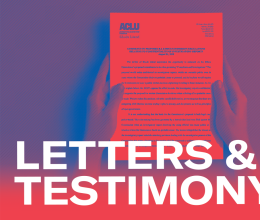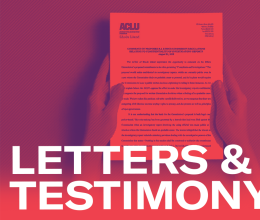The ACLU of R.I. today filed a federal lawsuit challenging the life-sized nativity scene and menorah in front of Cranston City Hall, as well as the policy that Mayor Stephen Laffey recently implemented to authorize those displays. The suit, filed by ACLU volunteer attorneys Miriam Weizenbaum and Amato DeLuca on behalf of life-long Cranston resident Grace C. Osediacz, argues that both the display and the policy violate the First Amendment.
The displays were erected with the approval of the Mayor pursuant to a new city policy promulgated this month designating the front lawn of City Hall a “limited public forum open for the purpose of appropriate seasonal and holiday displays” from December 5 to January 1, and giving the Mayor sole authority to approve all “appropriate holiday and seasonal decorations … appropriate being defined as being suitable and proper for the holiday occasion.”
The lawsuit makes a number of points in arguing that the display and the mayoral policy violate the First Amendment, including the following:
- The menorah and the nativity scenes are religious symbols and deliver an overtly religious message. In view of the placement of these religious symbols “at the threshold of the seat of government for the City of Cranston, between a public school and the School Administration Building, these displays have the principal and primary effect of advancing religion, and deliver a plain message that the Defendant Mayor and Defendant City endorse, sanction, promote, support and approve of the overtly religious message.”
- The Mayor’s effort “to legitimize these religious displays by declaring the lawn a ‘limited public forum’ that exists only during the time of these Jewish and Christian religious holidays is pretextual and legally inadequate. The front lawn of City Hall is not available as a public forum at any time other than Chanukah, the winter holiday of the Jewish religion, and Christmas, the Christian holiday that celebrates the birth of the Christian savior.”
- In light of the absence of a public forum on City Hall lawn during any non-sectarian holidays “or during any other time of the year for any other purpose, the creation of a ‘limited public forum’ from December 5 to January 1 further violates the First Amendment as it contributes to the appearance that the City of Cranston endorses two dominant religions in particular, Christianity and Judaism, and in general favors religion and religious holidays.”
- The policy, by giving a government official the authority to decide what are and are not “appropriate” religious symbols of a holiday, violates the First Amendment. The lawsuit seeks a court order barring both the future erection of religious displays on the front lawn of Cranston City Hall and the Mayor’s implementation of his new policy.
Since the controversy erupted, a number of City Council members have expressed opposition to the Mayor’s actions, and, in an attempt to water down the religiosity of the display, the Mayor has approved the erection of other displays, including fifteen flamingos in Santa Claus hats representing the “Church of the Flamingos.”
Plaintiff Osediacz said today: “I feel very strongly that religion simply is not the business of government. Rhode Island was founded on the principle that religion and government should be separate. I’m outraged that any public official would invite the placement of religious symbols right in front of City Hall.”
ACLU attorney Weizenbaum said: “The religious displays on the threshold of the seat of city government in Cranston require all who have business in city hall to see the City’s display of religion. The presence of flamingos and snow men doesn’t change that. While we are fortunate to live in a country where freedom to practice religion is protected by the Constitution, at the same time every person among us is entitled to feel secure that when you go to your government, religion is not a factor. Mayor Laffey has changed that for the people who pass and conduct business in Cranston City Hall. This is not a display in a private park, like the Pawtucket case. Further, the city’s policy gives the Mayor complete authority to choose whatever he considers ‘appropriate,’ religious or otherwise. This unfettered discretion and support for religion violates the United States Constitution.”
Added RI ACLU executive director Steven Brown: “Something is wrong when a Mayor takes it upon himself to decide what are or are not appropriate displays for the celebration of religious holidays. As we have seen time and again, whenever government gets involved in religion, it ends up trivializing it. That is a major reason why religious displays belong on private property, promoted by private individuals and religious institutions themselves, and not by politicians.”
A hearing in the case is not expected until sometime in 2004, and thus the lawsuit will affect only future displays, not this month’s display, which is scheduled to come down next week anyway.






